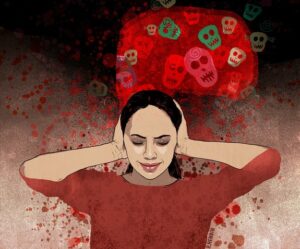Are you tired of constantly worrying about causing harm to yourself or others? Does the fear of harming someone keep you from living your life to the fullest? If so, you may be struggling with Harm OCD. While it can be a challenging disorder to overcome, there are proven methods and strategies that can help alleviate its symptoms. In this blog post, we will explore some of the best ways to cure Harm OCD and take back control over your thoughts and actions. So let’s dive in!
Contents
What is Harm OCD and What Are Its Symptoms?

Harm OCD is a type of OCD that is characterized by obsessive thoughts about harming oneself or others. People with Harm OCD may have intrusive thoughts about harming themselves or others, but they do not actually want to harm anyone. They may also engage in compulsive behaviours such as checking and washing in an attempt to prevent themselves from harming others. Symptoms of Harm OCD can vary in severity but can include anxiety, depression, insomnia, and social isolation.
How Can You Overcome Harm OCD?
 Harm OCD can be a tough thing to overcome, but it is possible. Here are some tips on how you can overcome Harm OCD:
Harm OCD can be a tough thing to overcome, but it is possible. Here are some tips on how you can overcome Harm OCD:
1. Educate yourself about Harm OCD. The more you know about the condition, the better equipped you will be to deal with it. There are many great resources out there that can help you learn more about Harm OCD.
2. Identify your triggers. What are the things that trigger your Harm OCD thoughts and behaviours? Once you know your triggers, you can start to work on avoiding them or managing them better.
3. Challenge your thoughts. When you have an intrusive thought about harming someone, take a step back and challenge that thought. Ask yourself if it really makes sense, and try to come up with a more rational explanation for why the thought popped into your head.
4. Practice exposure and response prevention (ERP). This is a type of cognitive-behavioural therapy that involves gradually exposing yourself to your fears and learning to resist the urge to engage in compulsive behaviours. This can be a very effective treatment for Harm OCD.
5. Seek professional help. If you find that you are struggling to manage your Harm OCD on your own, seek out professional help from a therapist or counsellor who specializes in treating anxiety disorders.
They can help you to understand your condition better and provide you with the support you need to overcome it.
These tips can help you manage and overcome Harm OCD. It is important to remember that it can take time and dedication to make progress, but with the right support and treatment, recovery is possible.
10 Tips to Overcome Harm OCD at Home
1. Acknowledge your thoughts and feelings without judgment.
2. Write down the thoughts and worries you have about the potential harm that you fear.
3. Practice relaxation techniques, such as deep breathing or progressive muscle relaxation.
4. Talk to someone you trust about your worries, like a close friend or family member.
5. Challenge the accuracy of your thoughts and focus on evidence that shows your fear is unlikely to happen.
6. Break compulsions into small steps and gradually work up to completing them without engaging in rituals.
7. Participate in activities that help distract from obsessive thoughts, like exercise or hobbies such as art or music.
8. Schedule regular times for worry so it doesn’t take over all of your time and energy throughout the day.
9. Consider talking to a counsellor or therapist who specializes in cognitive behavioural therapy (CBT) for help with OCD-related worries and fears.
10. Allow yourself to be vulnerable with others and practice self-care activities such as reading, writing, listening to music, meditating or taking hot baths or showers regularly to help manage anxiety levels related to harm OCD
Remember, there is hope and treatment available for Harm OCD. Talk to your doctor or therapist about what might be best for you.
Social Challenges People Face with Harm OCD
Harm OCD is a type of OCD that causes people to obsess over the possibility of harming themselves or others. People with Harm OCD may have intrusive thoughts about harming themselves or others and may engage in compulsive behaviors such as checking and reassurance seeking in order to prevent harm from happening. These obsessions and compulsions can interfere with daily life and cause significant distress.
There are several social challenges that people with Harm OCD may face. First, people with Harm OCD may avoid social situations out of fear of harming someone else. They may also isolate themselves to avoid potential triggers for their obsessions. Additionally, people with Harm OCD may find it difficult to maintain relationships due to the time and energy they must put into managing their disorder. Finally, people with Harm OCD may struggle with employment due to the impact of their symptoms on work performance.
If you are someone who has a friend with this disorder, you can help them by providing a supportive space where they can talk about their struggles. You can also offer to help them with tasks or activities that may trigger their symptoms and provide reassurance when they are feeling overwhelmed. Finally, it is important to educate yourself about Harm OCD so you can better understand the condition and how you can support your friend.
How Long Does It Take To Recover?
 If you are struggling with Harm OCD, know that you are not alone. Many people suffer from this type of OCD, and there is help available. The most important thing to remember is that recovery is possible. With the right treatment, you can overcome your OCD and live a happy, healthy life.
If you are struggling with Harm OCD, know that you are not alone. Many people suffer from this type of OCD, and there is help available. The most important thing to remember is that recovery is possible. With the right treatment, you can overcome your OCD and live a happy, healthy life.
So how long does it take to recover from Harm OCD? That depends on a number of factors, including the severity of your OCD, how long you have been struggling, and the type of treatment you receive. However, most people who seek treatment for their OCD see significant improvements within 12 weeks.
If you are ready to start your journey to recovery, reach out for help today. There are many resources available to support you on your road to wellness.
Conclusion
To overcome harm OCD, a person must be willing to challenge their fearful thoughts and practice self-soothing techniques. While it can take some time for these strategies to make an impact, with patience and consistency, the reward is worth it. With the right guidance and support from those who understand how difficult it can be to cope with harmful thinking patterns, anyone suffering from harm OCD can find relief and eventually break free of its grips.
For more information and guidance, please contact OCDMantra. OCD is a mental health disorder characterized by obsessions and compulsions. If you have any queries regarding OCD treatment, OCD Counseling, ERP therapy experienced therapists at OCDMantra can help: Book a trial OCD therapy session


